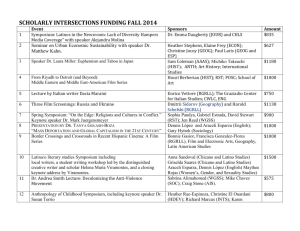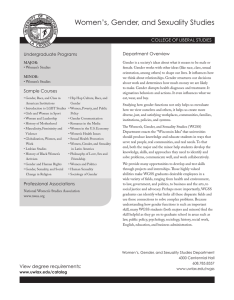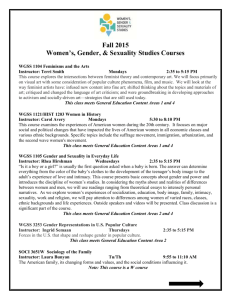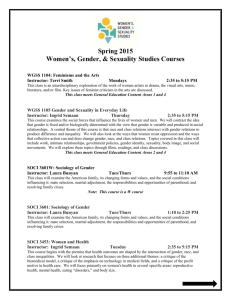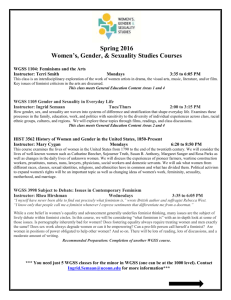Department of Women’s, Gender, and Sexuality Studies
advertisement
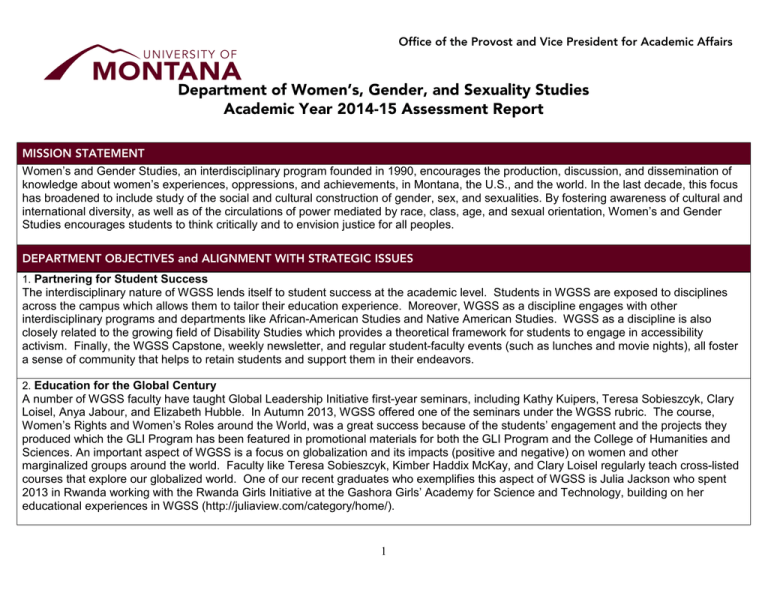
Office of the Provost and Vice President for Academic Affairs Department of Women’s, Gender, and Sexuality Studies Academic Year 2014-15 Assessment Report MISSION STATEMENT Women’s and Gender Studies, an interdisciplinary program founded in 1990, encourages the production, discussion, and dissemination of knowledge about women’s experiences, oppressions, and achievements, in Montana, the U.S., and the world. In the last decade, this focus has broadened to include study of the social and cultural construction of gender, sex, and sexualities. By fostering awareness of cultural and international diversity, as well as of the circulations of power mediated by race, class, age, and sexual orientation, Women’s and Gender Studies encourages students to think critically and to envision justice for all peoples. DEPARTMENT OBJECTIVES and ALIGNMENT WITH STRATEGIC ISSUES 1. Partnering for Student Success The interdisciplinary nature of WGSS lends itself to student success at the academic level. Students in WGSS are exposed to disciplines across the campus which allows them to tailor their education experience. Moreover, WGSS as a discipline engages with other interdisciplinary programs and departments like African-American Studies and Native American Studies. WGSS as a discipline is also closely related to the growing field of Disability Studies which provides a theoretical framework for students to engage in accessibility activism. Finally, the WGSS Capstone, weekly newsletter, and regular student-faculty events (such as lunches and movie nights), all foster a sense of community that helps to retain students and support them in their endeavors. 2. Education for the Global Century A number of WGSS faculty have taught Global Leadership Initiative first-year seminars, including Kathy Kuipers, Teresa Sobieszcyk, Clary Loisel, Anya Jabour, and Elizabeth Hubble. In Autumn 2013, WGSS offered one of the seminars under the WGSS rubric. The course, Women’s Rights and Women’s Roles around the World, was a great success because of the students’ engagement and the projects they produced which the GLI Program has been featured in promotional materials for both the GLI Program and the College of Humanities and Sciences. An important aspect of WGSS is a focus on globalization and its impacts (positive and negative) on women and other marginalized groups around the world. Faculty like Teresa Sobieszcyk, Kimber Haddix McKay, and Clary Loisel regularly teach cross-listed courses that explore our globalized world. One of our recent graduates who exemplifies this aspect of WGSS is Julia Jackson who spent 2013 in Rwanda working with the Rwanda Girls Initiative at the Gashora Girls’ Academy for Science and Technology, building on her educational experiences in WGSS (http://juliaview.com/category/home/). 1 3. - Discovery and Creativity Co-Director Anya Jabour is a member of the nascent H&S Humanities Institute committee that aims to increase research and collaboration around Humanities disciplines on campus. As part of this initiative, the WGSS Program was highlighted in the H&S Intellectual Dialogue in Spring 2014 as Professors Sara Hayden and Kimber Haddix McKay discussed gender from their respective disciplines (Communication Studies and Anthropology). 4. - Dynamic Learning Environment WGSS is at the forefront of UM’s efforts to address the issue of sexual violence on our campus and in our community. One of the WGSS Co-Directors, Beth Hubble, is the co-author of PETSA and is the co-chair of the University Council on Student Assault. She also served as the chair of the Search Committee for the Campus Assault Prevention Coordinator, as well as being one of the team members who wrote and submitted the proposal for the Cooperative Agreement with the Office of Violence Against Women which funds many of our current prevention efforts. Both WGSS Co-Directors and the WGSS Program Coordinator are trained sexual assault prevention advocates. STUDENT LEARNING GOALS AND MEASUREMENT TOOLS <Measurement Tool> <Measurement Tool> 1. An understanding of the powerful and central impact of the concepts of human sex and gender within their major areas of study 2. A basic grasp of the history of women and the notions of gender as it relates to their major areas of study 3. A basic understanding of philosophical, anthropological sociological, and/ or psychological dynamics with regard to sex, gender, men/masculinities and women/femininities. 4. An ability to articulate current research and political concerns within Women’s and Gender Studies 2 <Measurement Tool> <Measurement Tool> <Measurement Tool> 5. A sophisticated awareness of and appreciation for the dynamic interplay between knowledge, research, beliefs, and politics as these interact in the building and maintenance of cultural practices with regard to sex and gender expectations, limits, freedoms, and prohibitions. 3 RESULTS AND MODIFICATIONS Because the majority of classes for our program are offered by faculty housed in other departments, assessment tools vary from class to class and thus from student to student. The “core” curriculum was designed to ensure that regardless of what other classes they might take, all students would gain the competencies listed above. Students’ competencies in these areas are measured by written exams, research papers, and service-learning projects as well as by participation in and successful completion of all assignments in the required classes. The “core” consists of: WGSS 163L: Historical and Literary Perspectives on Women WGSS 263S: Social and Political Perspectives on Women, Gender, and Sexuality WGSS 363 (UDW): Feminist Theory and Methods WGSS 463: Women’s and Gender Studies Capstone APPENDICES none FUTURE PLANS FOR CONTINUED ASSESSMENT Currently, all students enrolled in the WGSS capstone complete an assessment of the program. We expect the number of students completing this assessment to increase with the implementation of our new major in Fall 2015. We will continue to refine this assessment tool. 4
